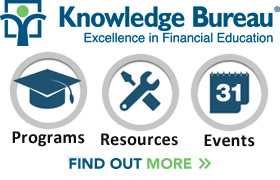
The UHT May Be Cancelled, But Vacancy Taxes Remain
As tax professionals, you are keenly aware of the constant changes our federal government makes to the Income Tax Act. Adjustments are made, and you must adapt. Not often, though, is a tax eliminated altogether. But in the case of the Underused Housing Tax (UHT), that is exactly what has happened – it was cancelled in the federal budget of November 4, 2025, but Canada’s underused housing taxes have not been eliminated. Here’s what you need to know for tax season 2026.Deemed Dispositions at Death
 When a person dies in Canada there are hundreds of decisions which must be made. That’s why getting one’s affairs in order is so important, long before the event. In this second in our series on death and taxes in Canada, we’ll consider the highlights for discussions to be had with clients about reporting requirements at death of a taxpayer.
When a person dies in Canada there are hundreds of decisions which must be made. That’s why getting one’s affairs in order is so important, long before the event. In this second in our series on death and taxes in Canada, we’ll consider the highlights for discussions to be had with clients about reporting requirements at death of a taxpayer.
New Trends in Tax Audit Defence and Appeals: Protecting Clients in a Shifting Landscape
 The 2025 tax filing year is shaping up to be one of the most challenging in recent memory, with penalties and interest costs on the rise and the CRA facing significant hurdles in managing information during peak filing season. Against this backdrop, the CE Savvy Summit on September 17, 2025 will host a critical session: New Trends in Tax Audit Defence and Appeals, led by Kim G.C. Moody, an experienced tax expert, who will unpack the implications of CRA’s expanding audit powers.
The 2025 tax filing year is shaping up to be one of the most challenging in recent memory, with penalties and interest costs on the rise and the CRA facing significant hurdles in managing information during peak filing season. Against this backdrop, the CE Savvy Summit on September 17, 2025 will host a critical session: New Trends in Tax Audit Defence and Appeals, led by Kim G.C. Moody, an experienced tax expert, who will unpack the implications of CRA’s expanding audit powers.
Stand Out in a Competitive Market with Professional Practitioner Diplomas
 In a market where clients demand more from their advisors, the ability to provide specialized, high-level advice has never been more important. The Professional Practitioner Diploma (PPD) equips financial professionals with the advanced knowledge and credentials needed to differentiate themselves, build client trust, and compete effectively in a crowded financial services landscape.
In a market where clients demand more from their advisors, the ability to provide specialized, high-level advice has never been more important. The Professional Practitioner Diploma (PPD) equips financial professionals with the advanced knowledge and credentials needed to differentiate themselves, build client trust, and compete effectively in a crowded financial services landscape.
Year-End Planning 2025: Helping Young Entrepreneurs Build Wealth Tax Efficiently
 At Acuity 2025, Larry Frostiak, FCPA, FCA, CFP, TEP, RWM™, FDFS™, will lead a session titled “Year-End Planning 2025: How Young Entrepreneurs Can Build Wealth Tax Efficiently,” focusing on strategies for Canada’s emerging business leaders. Young entrepreneurs often dream of independence, but unpredictable income, evolving tax rules, and the demands of balancing business growth with family can make building wealth seem daunting.
At Acuity 2025, Larry Frostiak, FCPA, FCA, CFP, TEP, RWM™, FDFS™, will lead a session titled “Year-End Planning 2025: How Young Entrepreneurs Can Build Wealth Tax Efficiently,” focusing on strategies for Canada’s emerging business leaders. Young entrepreneurs often dream of independence, but unpredictable income, evolving tax rules, and the demands of balancing business growth with family can make building wealth seem daunting.
Mid-Summer Reviews: When to Collect OAS and CPP
 Did you know that 61% of Canadians are afraid of running out of money during retirement? According to a new CPP Investments survey, that fear is widespread. Yet surprisingly few people understand even the basics of public pension planning. For example, Canadians are not obliged to begin OAS or CPP at age 65. By delaying, they can significantly boost after-tax income and improve retirement security.
Did you know that 61% of Canadians are afraid of running out of money during retirement? According to a new CPP Investments survey, that fear is widespread. Yet surprisingly few people understand even the basics of public pension planning. For example, Canadians are not obliged to begin OAS or CPP at age 65. By delaying, they can significantly boost after-tax income and improve retirement security.
Paring down: When and How to Deregister from the HST
 Businesses with revenue over the small supplier threshold ($30,000 in worldwide revenues over four consecutive calendar quarters) must register for, collect, and remit GST or, in participating provinces, HST. However, there are circumstances where a business may choose—or be required—to deregister. This article explains when and how deregistration happens, the consequences, and the steps involved.
Businesses with revenue over the small supplier threshold ($30,000 in worldwide revenues over four consecutive calendar quarters) must register for, collect, and remit GST or, in participating provinces, HST. However, there are circumstances where a business may choose—or be required—to deregister. This article explains when and how deregistration happens, the consequences, and the steps involved.

